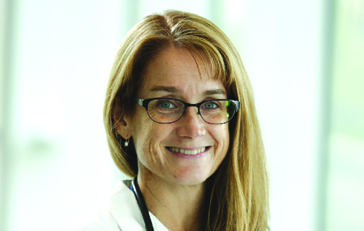Recent Covid-19 surges have booster shots on the minds of many Oklahomans. But who should get one?
While an additional SARS-CoV-2 vaccine dose after initial vaccination is important for the most vulnerable, not everyone needs one just yet, say Oklahoma Medical Research Foundation experts.
“Extra doses are only recommended for specific groups,” said OMRF immunologist Eliza Chakravarty, M.D. “Certain immunocompromised people, as well as Pfizer vaccine recipients who are 65 and up, who live in long-term care facilities, or who are at high risk because of an underlying medical condition associated with severe Covid-19.”
The first group makes up just 3% of the U.S. population, but is critical, said Chakravarty. Because while the Covid-19 vaccines approved for use in the U.S. offer strong protection against severe illness and death in most people, studies have shown some moderate to severely immunocompromised individuals did not respond well to the initial vaccine series and may remain vulnerable.
“This includes people taking certain high-dose steroids and other immunosuppressant drugs,” said OMRF physician-scientist Hal Scofield, M.D. “People undergoing active cancer treatment for tumors or cancers of the blood, as well as people with advanced or untreated HIV infection are included, too.”
In response, the U.S. Food and Drug Administration expanded the emergency use authorization of Pfizer and Moderna’s Covid-19 vaccines to this fraction of Americans. They should consult with their doctor and, if advised, receive a third dose of the vaccine they initially received at least 28 days after their second dose.
In September, the U.S. Centers for Disease Control and Prevention also recommended boosters for three groups who received their second Pfizer dose at least six months prior. Those people are adults ages 65 and up, residents of long-term care facilities, and people aged 50-64 years who have underlying conditions such as chronic lung disease, dementia, diabetes, heart disease and obesity. A full list of high-risk conditions is available at www.cdc.gov/coronavirus.
Additionally, the CDC said, adults aged 18-49 with those same underlying medical conditions or aged 18-64 who live or work in high-risk environments such as health care or schools may choose to get a Pfizer booster after assessing their own risk. “Those who qualify in this first booster wave should check with their primary care physician and get the shot if advised,” said Scofield. “If you received a vaccine other than Pfizer’s, stay tuned.”
With high community rates of Covid-19 and more than 40% of Oklahoma adults not fully vaccinated, initial doses, masks, and physical distancing remain important, said Chakravarty.
“The vaccines work. The majority of patients hospitalized, ventilated and dying from Covid are those who haven’t been fully vaccinated,” she said. “Boosters may be top of mind for some, but moving the needle on initial vaccination is critical to save lives.”













